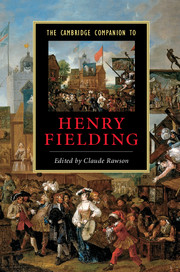Book contents
- Frontmatter
- Introduction
- 1 Henry Fielding’s life
- 2 Fielding’s theatrical career
- 3 Shamela
- 4 Joseph Andrews
- 5 Jonathan Wild
- 6 Tom Jones
- 7 Amelia
- 8 Fielding’s periodical journalism
- 9 Fielding and female authority
- 10 Fielding on society, crime, and the law
- 11 Fielding’s style
- 12 Fielding’s afterlife
- Guide to further reading
- Index
- Series List
4 - Joseph Andrews
Published online by Cambridge University Press: 28 July 2007
- Frontmatter
- Introduction
- 1 Henry Fielding’s life
- 2 Fielding’s theatrical career
- 3 Shamela
- 4 Joseph Andrews
- 5 Jonathan Wild
- 6 Tom Jones
- 7 Amelia
- 8 Fielding’s periodical journalism
- 9 Fielding and female authority
- 10 Fielding on society, crime, and the law
- 11 Fielding’s style
- 12 Fielding’s afterlife
- Guide to further reading
- Index
- Series List
Summary
A key moment in Fielding’s first novel finds Parson Adams holed up (as often) in an inn, reading his beloved manuscript of Æschylus. Suddenly he notices Fanny Goodwill, the virtuous dairymaid under his protection, swoon: 'Adams jumped up, flung his Æschylus into the Fire, and fell a roaring to the People of the House for Help'. At once Joseph Andrews, on his way home to see Fanny and providentially located in the next room, appears, and the lovers are for the time being reunited. But the manuscript, 'his dear Friend, which was the Work of his own Hands, and had been his inseparable Companion for upwards of thirty Years' (155), is gone for ever.
We might think about this moment in relation to Henry James’s point, in the classic essay ’the Art of Fiction', written in 1884, that there is no essential distinction between novels of incident and novels of character. True, an early reader of the novel, Thomas Gray, finds himself led to separate the aspects in a letter to Richard West of 8 April 1742: ’the incidents are ill laid … but the characters have a great deal of nature, which always pleases even in her lowest shapes. Parson Adams is perfectly well; so is Mrs Slipslop'. It is also true that the understanding of 'character' here does not have a subtle, extended, Jamesian depth, but is derived from the principle Fielding learned in comic drama, that selfhood has to be quickly recognizable and not subject to much change or development. The crabstick-wielding Adams, with his finger-snapping, forgetfulness, indomitable energy ('brisk as a Bee'), sexual innocence (despite his prodigious brood of children), fearless generosity of spirit, and mildly culpable pride in learning, was always the 'character' that readers were tempted to extract from the book.
- Type
- Chapter
- Information
- The Cambridge Companion to Henry Fielding , pp. 50 - 64Publisher: Cambridge University PressPrint publication year: 2007
- 1
- Cited by

